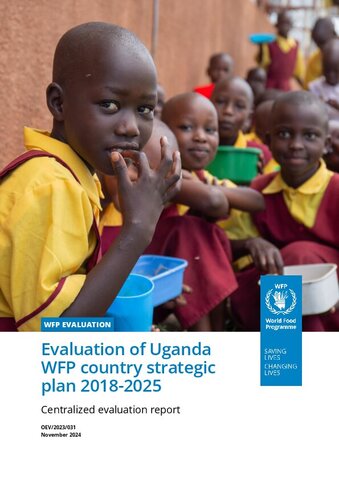
The 2018-2025 WFP's country strategic plan for Uganda aims at maintaining WFP’s emergency response capacity and supporting the Government in disaster preparedness and in hosting the growing number of refugees. The plan has six strategic outcomes, with two focusing on crisis response and the others addressing aspects of resilience building along with malnutrition and some of the root causes of food insecurity.
The evaluation found that the country strategic plan is evidenced-based, aligned with national priorities and adapted to evolving circumstances. Its design and implementation reflect WFP’s traditional comparative advantages in emergency response and logistics, food security and nutrition, but integration among strategic outcomes and activities was fragmented during the period under evaluation. WFP demonstrated effectiveness and the prospect of sustainability in its work on strengthening national and local capacity relevant to shock-responsive social protection systems. WFP made efforts to address cross-cutting issues such as those related to gender, environment and accountability to affected people, but a more systematic approach is required.
The evaluation resulted in six recommendations aimed at enhancing WFP's ability to design and implement its next country strategic plan for Uganda. Strategically, WFP should enhance programmatic integration and coherence among activities; clearly define and strengthen its role as an enabler of sustainable government capacity and systems; develop a more strategic and sustainable approach to partnerships; and enhance its leadership and catalytic role in food systems transformation. Operationally, WFP should improve the design and sustainability of resilience-building and self-reliance interventions; and strengthen the advancement of cross-cutting priorities.
| Document | File |
|---|---|
| Summary evaluation report (English) |
PDF | 582.91 KB
Download
|
| Summary evaluation report (French) |
PDF | 1020.37 KB
Download
|
| Summary evaluation report (Spanish) |
PDF | 886.06 KB
Download
|
| Summary evaluation report (Arabic) |
PDF | 776.04 KB
Download
|
| Management response (English) |
PDF | 241.67 KB
Download
|
